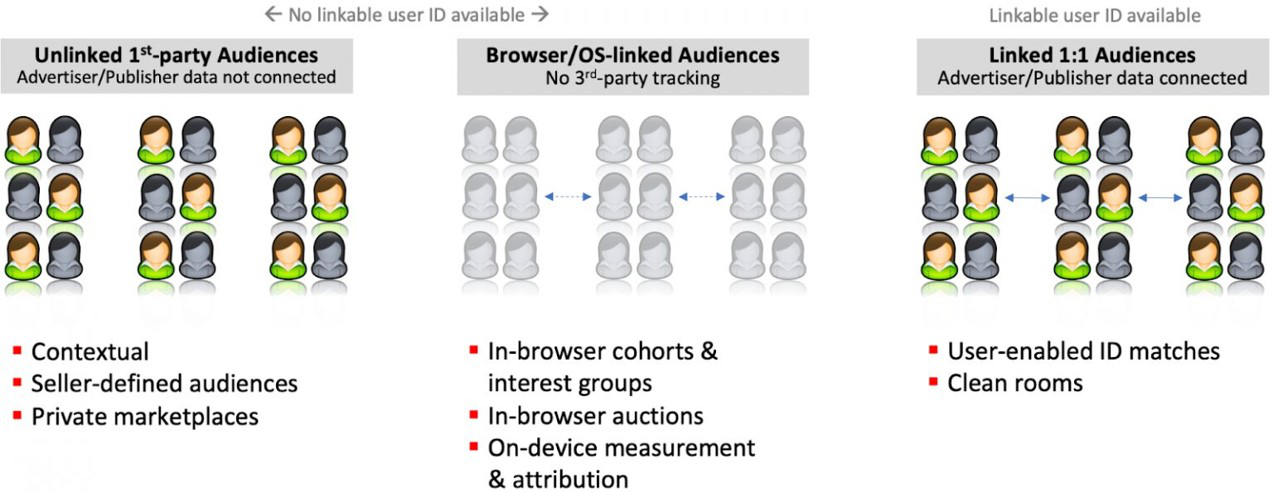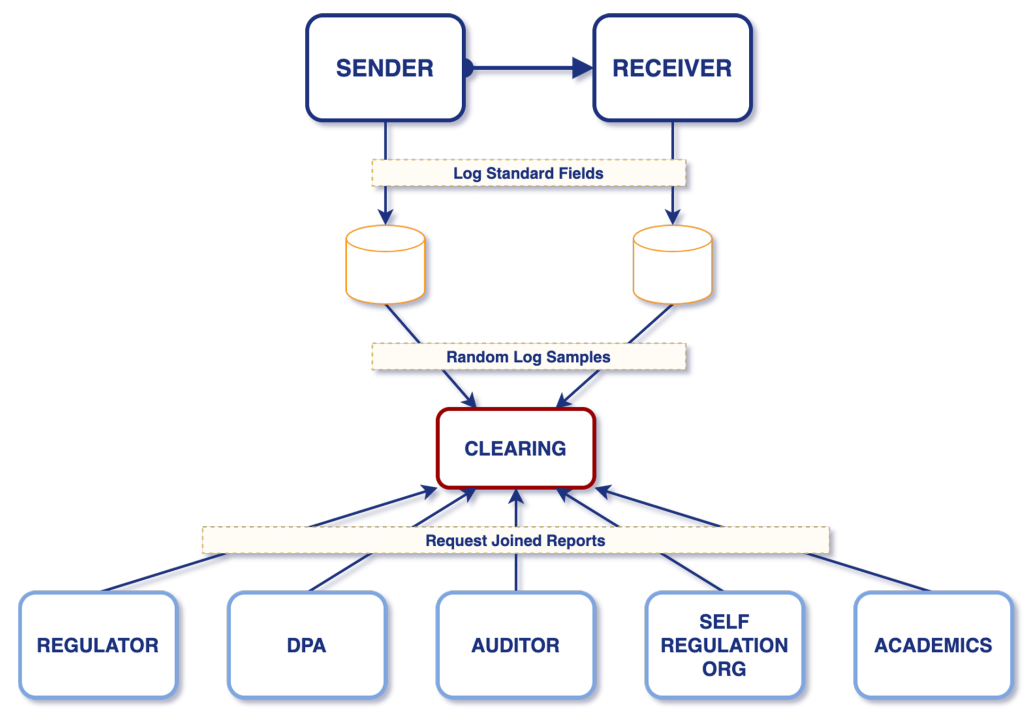Project Rearc was launched in 2020 to collaboratively ‘re-architect’ digital advertising in response to the inevitable deprecation (or limitation) of third-party cookies and other identifiers.
The approach taken was to review industry requirements and then build systems and standards that could preserve addressability with consumer privacy and security as a priority. This has resulted in a portfolio approach, based upon whether an advertiser’s audience data can be linked to a publisher’s audience data – and if so by whom. The three core scenarios identified are as per the below:

image source: IAB Tech Lab
The third scenario (1:1 Linked Audiences) describes environments where publisher and advertiser audiences can be linked using some token of identity resolution and data management platforms. A key requirement of such an approach is to have systems developed for gathering consumer consent via Consent Management Platforms (CMPs) and standards created for signaling that consent. To read more about consent signals click here
Additionally a system is required to ensure that supply chain participants can consistently demonstrate that they are adhering to and respecting any consumer preferences and consent signals received. This has resulted in the development of IAB Tech Lab’s Accountability Platform, released as a draft technical audit framework on 14th December 2023 with a 75-day public comment period until 27th February, 2024.
We’ll provide a brief overview of the Accountability Platform and for a list of further Project Rearch initiatives you can find these towards the bottom of this article.
About IAB Tech Lab
Just a quick reminder about IAB Tech Lab – which develops, oversees and updates critical global technical standards and solutions – designed to enable and support a healthy and sustainable digital media and advertising industry. Key areas of focus are transparency, fraud, identity, data, consumer privacy, ad experiences & measurement, and programmatic effectiveness.
IAB Tech Lab Accountability Platform
The Accountability Platform is designed to provide consistent technical audit opportunities to support the industry in audit obligations, investigations, and other checks and balances endeavors.
Further, it demonstrates who’s involved in data sharing and their conformity to the preferences and restrictions set by users and the digital properties they visit.
It proposes to enable these capabilities through:
- Providing a model for monitoring propagation of signals and validating they are accurately communicated.
- Providing sufficient information when signals aren’t properly communicated to enable investigation and remediation.
- Providing a normalised, standard privacy compliance data set for global audits.
- Being privacy signal agnostic.
- Being designed to benefit researchers, auditors & regulators.
- Creating a foundation for technical accountability.
The platform is designed to support monitoring of any ad-related sharing of user data through the periodic collection of samples. These samples are explicitly designed to not contain any user data other than the preference signals.
There are two principal roles in the Accountability Platform: ecosystem participants and a common operator.
Ecosystem participants – include all entities in an ad tech value chain that transact data derived from a relationship with a user and which could have associated preference signals. Ecosystem participants are further divided into two additional roles played in data-related transactions: they are either a sender who is providing data or a receiver to whom data is being provided. A given participant can play both roles and, in the case of intermediaries, generally will.
The common operator – coordinates the gathering of data from participants, the processing of the data and making outputs available.
There are four key stages to the process:

image source: IAB Tech Lab
Logging – Data about transactions which include consent signals is logged independently by Senders and Receivers.
Preparation – Data is gathered from logs by participants for a time window and packaged for submission.
○ Data includes minimal information for a small subset of end-to-end supply chain transactions.
○ What data is to be included is published after logging, to prevent treating the sample differently.
○ Post processing is performed to assure data is not identifying and may include aggregation of event-level records.
Processing – Sender records are matched with Receiver records. The matching criteria will vary depending on whether it is event-level or has been aggregated. Outputs are sets of records or counts where:
○ Sender/Receiver consent signals match
○ Sender/Receiver consent signals do not match
○ Sender has no matching Receiver record
○ Receiver has no matching Sender record
○ Errors prevent their being processed
Provisioning – The record sets are made available to interested parties for download and analysis.
As a simple visual of the proposed architecture see below.

image source: IAB Tech Lab
The general intent of the platform is to encourage responsible use of identifiers in ad delivery and measurement use-cases by providing support for employing them in accordance with user preferences. It is expected that the platform will encourage participants to be more mindful of their use of identifiers and careful in the handling and application of them. It is anticipated that as a consequence users will be more willing to support use of identifiers, knowing their use is monitored, validated and easily audited.
To review the draft specs simply click on the relevant link at the bottom of this page. Also below is a list of, with links to further reading about, other Project Rearc initiatives.
Other Project Rearc Initiatives
Global Privacy Platform (GPP) – A unified global architecture to manage consumer privacy preferences according to local level regulations. Click here to read more on this initiative
Seller Defined Audiences – Enables publishers, DMPs and data providers to scale their first-party data responsibly and reliably without data leakage or reliance on technologies that are being disrupted. Click here to read more on this initiative
SKAd Network Lists – Created to support companies adopting Apple’s SKAdNetwork measurement solution. The SKAdNetwork List is a tool designed to help manage and maintain SKAdNetwork IDs. Click here to read more on this initiative
PETs Initiative – Privacy Enhancing Technologies (PETs) are sophisticated technologies currently employed by enterprises within the insurance and financial industries and they are used to maximise data security while minimising the use of personal data. This workstream explores the integration of such technology within the advertising industry to preserve the security of first-party data. Click here to read more on this initiative
User-Enabled ID Tokens – Guidelines for the encryption and use of user-enabled IDs—notably email addresses or phone numbers—in scenarios when online publishers or marketers offer personalised content or services tied to a user-provided email or phone number. The Tokenisation Framework is not designed to support any single commercial ID solution. The specification is intended to support a foundation of technical connective tissue by which advertisers and publishers can interoperate with myriad ID resolution providers of a publisher’s or advertiser’s choice in a secure environment. Click here to read more on this initiative